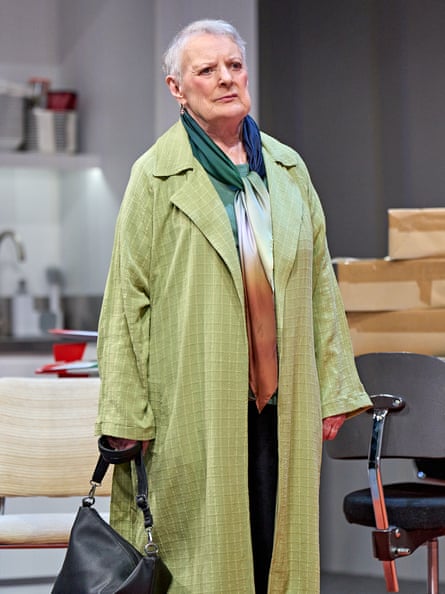Oedipus review – Lesley Manville and Mark Strong electrify ancient saga turned political thriller
Wyndham’s theatre, LondonOpening in a campaign room on election night, Robert Icke’s modern retelling is riveting from beginning to end, the formidable leads supported by a stellar ensemble cast
 Arifa AkbarWed 16 Oct 2024 04.41 EDTLast modified on Wed 16 Oct 2024 08.01 EDTShareIt begins with a birth certificate. A politician standing for election promises to prove his origins to the nation after his opponent has questioned them (a dig at Donald Trump in relation to Barack Obama’s heritage?). Even so, he questions the nativist idea that birth is crucial to belonging.
Arifa AkbarWed 16 Oct 2024 04.41 EDTLast modified on Wed 16 Oct 2024 08.01 EDTShareIt begins with a birth certificate. A politician standing for election promises to prove his origins to the nation after his opponent has questioned them (a dig at Donald Trump in relation to Barack Obama’s heritage?). Even so, he questions the nativist idea that birth is crucial to belonging.
Of course, the ancient Greek drama on which Robert Icke’s play is based is all about origins and the tragedy of Oedipus’s cursed birth. Icke has modernised Sophocles’ story but kept the ancient names. The statesman, Oedipus, is intent on truth-telling and full disclosure but it is just this that leads to his downfall.
Icke, who directs too, has form with modernising Greek drama from his 2015 adaptation of Aeschylus’s Oresteia. This play has already been performed in Dutch in 2018 and at the Edinburgh international festival in 2019. However far-fetched (even preposterous) this ancient story seems, and however creaky Freud’s theory of unconscious desires, its transformation into a political thriller-cum-family tragedy is riveting from beginning to end.
 View image in fullscreenGrand and tragic … June Watson as Merope. Photograph: Manuel HarlanThe stage opens to a campaign room on election night, with the clean-cut, soon-to-be prime minister having a celebratory dinner with his family (it looks like a landslide victory). Mark Strong as the upstanding, self-righteous Oedipus opposite Lesley Manville as a breezy and dynamic Jocasta, first set us on the edge of our seats and then set the stage on fire. They have a stellar ensemble around them, from their upstart daughter, Antigone (Phia Saban), and Oedipus’s slippery brother-in-law, Creon (Michael Gould), to his boisterous sons (Jordan Scowen and James Wilbraham) and crotchety mother, Merope (June Watson, grand and tragic). But it really is Manville and Strong who make this production electric; rarely has a show had two such formidable leads who become stronger with every scene.
View image in fullscreenGrand and tragic … June Watson as Merope. Photograph: Manuel HarlanThe stage opens to a campaign room on election night, with the clean-cut, soon-to-be prime minister having a celebratory dinner with his family (it looks like a landslide victory). Mark Strong as the upstanding, self-righteous Oedipus opposite Lesley Manville as a breezy and dynamic Jocasta, first set us on the edge of our seats and then set the stage on fire. They have a stellar ensemble around them, from their upstart daughter, Antigone (Phia Saban), and Oedipus’s slippery brother-in-law, Creon (Michael Gould), to his boisterous sons (Jordan Scowen and James Wilbraham) and crotchety mother, Merope (June Watson, grand and tragic). But it really is Manville and Strong who make this production electric; rarely has a show had two such formidable leads who become stronger with every scene.
It is not only about a couple doomed by their love but contains cross currents of family drama, from mother-daughter battles to a son’s coming out and profound reflections on life, death and sex. All of it is deeply felt.
A stop-clock counts the hours and minutes to the election results but also marks the inevitable forward movement to terrible self-knowledge. Foreshadowing is tucked into family exchanges, perhaps a little heavy-handedly: when one son playfully covers Oedipus’s eyes, he jokes about being blinded in a fleeting reference to the gouging of his eyes at the end. “Did you cook this, Mum?” he asks at the dining table, and it is his wife who answers (later turning out to be his mother).
Notions of coincidence, fate and prophesies swim like dangerous undercurrents beneath the rational, controlled forces in Oedipus’s life. The predictions of new age “future-teller” Teiresias (Samuel Brewer) sound like ravings to Oedipus at the start but we see, through Strong’s performance, how they creep further into his mind, inch by inch, until they are solid truths. Hildegard Bechtler’s realist set gradually becomes emptier until the final blood-letting, which brings visceral shock and a symbolic, windy emptiness.
The classicist John Tresidder Sheppard deemed Sophoclean language “hard to analyse, impossible to translate”. Icke has done an astonishing job in both departments. An old play is masterfully analysed and made newly devastating.
At Wyndham’s theatre, London, until 4 January